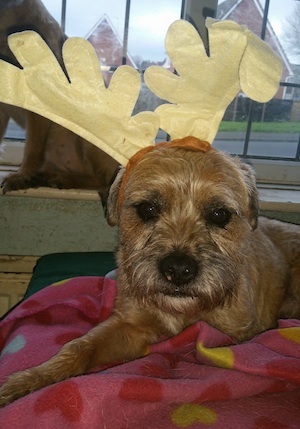Is Santa Paws visiting your pet this year?
 As Christmas approaches, the Dogs’ Trust reminds us that ‘A dog is for life, not just for Christmas.1’ While dogs or puppies should never be given as Christmas presents, how many of us are planning to give gifts to the dog or cat in our lives?
As Christmas approaches, the Dogs’ Trust reminds us that ‘A dog is for life, not just for Christmas.1’ While dogs or puppies should never be given as Christmas presents, how many of us are planning to give gifts to the dog or cat in our lives?
According to University of Warwick researcher Professor Nickie Charles, dogs and other companion animals are increasingly becoming participants in the seasonal exchange of cards and gifts, reinforcing their position as part of the family - and maybe even looking forward to their own place at the Christmas table.
But what actually happens at this time of year? Are pets really involved in the giving and receiving of presents and cards? And do they enjoy the rituals of Christmas alongside their human companions?
Professor Nickie Charles researches the relationships between humans and the animals they share their homes with. She has found that many people make sure that their pets are included in the celebrations at this time of year, saying: “It seems to be mostly dogs who are included.”
 “Cats and other animals are not so interested in the whole business of present giving although they may be given something special – different food or a new toy - on Christmas Day.
“Cats and other animals are not so interested in the whole business of present giving although they may be given something special – different food or a new toy - on Christmas Day.
“Dogs, on the other hand, may get excited when they see the preparations for Christmas and are often given presents along with other family members.
“They hunt out their own presents under the tree - these are often something which is attractive to them because it has a smell or squeaks - and when they find it they enjoy ‘unwrapping’ it. Ripping paper off toys and chews is great fun!
“Some dogs also have their own stockings, running upstairs on Christmas morning to open them, as excited about it as any child.”
Professor Charles has also found that companion animals send Christmas cards to their loved ones: “Sometimes their name is the only one that appears on a card but often it is included with those of other family members. These cards are usually sent to close family or friends – often people who have animals themselves – and is an indication that the animals are counted as part of the family.”
Some dog owners like to organise special doggy Christmas parties, where the dogs dress up in seasonal clothes, play party games and eat party food, usually sausages, always accompanied by their humans. One group of people Professor Charles spoke to as part of her research organised a party in a local park, putting up notices weeks in advance so that all the dog walkers in the area could gather on Christmas morning.
Professor Charles added: “My research into our relationships with companion animals shows that for many people, companion animals are important family members and this includes participating in family celebrations such as Christmas.
“However, not everyone includes their pets in Christmas celebrations. Those that don’t point out that human celebrations have no meaning for animals and that a ‘dog is just a dog’.
“This reflects the different ways that people relate to their animal companions, with some regarding them as quasi-humans, participating in family celebrations in the same way as them, and others recognising that companion animals have their own needs and preferences which do not necessarily include engaging in the rituals of the festive season.”
14 December 2017
1. A Dog is For Life, Not Just for Christmas is trademarked to the Dogs Trust. For more about their work visit https://www.dogstrust.org.uk/.
Photo caption: Border Terrier Baldrick, known by his doggie pals as Mr B, enjoys Christmas presents, parties and dressing up. Mr B lost his left front leg in 2015 when he was attacked by another dog but lives life to the full with the help of a set of wheels and the support of the Hope's Chest group.
Contact:
Sheila Kiggins
Media Relations Manager,
Social Science
S.Kiggins@warwick.ac.uk
07876 218166
